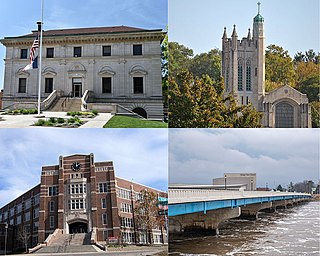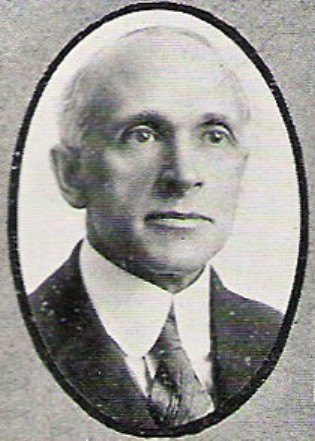
Des Moines is the capital and most populous city in the U.S. state of Iowa. It is the county seat of Polk County with parts extending into Warren County. It was incorporated on September 22, 1851, as Fort Des Moines, which was shortened to "Des Moines" in 1857. It is located on, and named after, the Des Moines River, which likely was adapted from the early French name, Rivière des Moines, meaning "River of the Monks". The city's population was 214,133 as of the 2020 census. The six-county metropolitan area is ranked 81st in terms of population in the United States, with 709,466 residents according to the 2020 census by the United States Census Bureau, and is the largest metropolitan area fully located within the state.

Ankeny is a city in Polk County, Iowa, United States and a suburb of the state capital of Des Moines, as part of the Des Moines-West Des Moines, IA metropolitan statistical area. As of the 2020 census, the population of Ankeny was 67,887, making it the seventh most populous city in the state. It is one of the fastest-growing cities in Iowa. Currently, the city's incorporated area totals 29.14 square miles.

Ottumwa is a city in and the county seat of Wapello County, Iowa, United States. The population was 25,529 at the time of the 2020 U.S. Census. Located in the state's southeastern section, the city is split into northern and southern halves by the Des Moines River.

The Iowa Old Capitol Building is located in Iowa City, Iowa, United States. It was once the main government building for the state of Iowa, and it now stands as the most prominent landmark at the center of the University of Iowa's campus. The building was depicted on the 1946 Iowa Centennial commemorative half dollar. It was individually listed in the National Register of Historic Places (NRHP) in 1972, and it was named a U.S. National Historic Landmark in 1976. In 1978 it was included as a contributing property in the Pentacrest, a historic district listed on the NRHP.

Osceola station is an Amtrak intercity train station in Osceola, Iowa, United States served by Amtrak. Osceola is the closest Amtrak station to Des Moines, Iowa's capital and most populous city, which is about 50 miles (80 km) to the north. The station is listed on the National Register of Historic Places as Chicago, Burlington and Quincy Depot.

The Idaho State Historical Society (ISHS) is a historical society located in the U.S. state of Idaho that preserves and promotes the state's cultural heritage.

The Fort Des Moines Provisional Army Officer Training School was a military base and training facility on the south side of Des Moines, Iowa. Established in 1901, the base trained African American officers for the U.S. Army during World War I and was where women first began training for US Army service in 1942 as part of the Women's Army Corps. Surviving older portions of the base were declared a National Historic Landmark in 1974 in recognition of this history. The fort property was turned over to the city in the 1950s, and has since been put a number of public and private uses.

The following is an alphabetical list of articles related to the state of Iowa.

The archaeology of Iowa is the study of the buried remains of human culture within the U.S. state of Iowa from the earliest prehistoric through the late historic periods. When the American Indians first arrived in what is now Iowa more than 13,000 years ago, they were hunters and gatherers living in a Pleistocene glacial landscape. By the time European explorers visited Iowa, American Indians were largely settled farmers with complex economic, social, and political systems. This transformation happened gradually. During the Archaic period American Indians adapted to local environments and ecosystems, slowly becoming more sedentary as populations increased. More than 3,000 years ago, during the Late Archaic period, American Indians in Iowa began utilizing domesticated plants. The subsequent Woodland period saw an increase on the reliance on agriculture and social complexity, with increased use of mounds, ceramics, and specialized subsistence. During the Late Prehistoric period increased use of maize and social changes led to social flourishing and nucleated settlements. The arrival of European trade goods and diseases in the Protohistoric period led to dramatic population shifts and economic and social upheaval, with the arrival of new tribes and early European explorers and traders. During the Historical period European traders and American Indians in Iowa gave way to American settlers and Iowa was transformed into an agricultural state.
The Iowa Department of Education sets the standards for all public institutions of education in Iowa and accredits private as well as public schools. It is headquartered in Des Moines.

Charles Reuben Keyes was a pioneering American archaeologist and linguist based in Iowa, known as the founder of modern Iowa archaeology. He is, with Ellison Orr (1857-1951), considered a key person to gaining protection for the Effigy Mounds National Monument, established by Congress in 1949 to protect hundreds of prehistoric earthworks built by indigenous Native American cultures.

History Colorado is a historical society that was established in 1879 as the State Historical Society of Colorado, also known as the Colorado Historical Society. History Colorado is a 501(c)(3) organization and an agency of the State of Colorado under the Department of Higher Education.

Iowa is a state in the upper Midwestern region of the United States. It borders the Mississippi River to the east and the Missouri River and Big Sioux River to the west; Wisconsin to the northeast, Illinois to the east and southeast, Missouri to the south, Nebraska to the west, South Dakota to the northwest, and Minnesota to the north.

Iowaville was a small town on the lowland near the northeast bank of the Des Moines River, near the line between Davis and Van Buren counties, and between present-day Eldon and Selma, Iowa, United States. It was established about 1838 near the site of earlier trading posts. Iowaville is now farm land with almost nothing to show the town location, but it is an important Iowa archaeological site.

This is intended to be a complete list of the properties and districts on the National Register of Historic Places in Downtown Davenport, Iowa, United States. Downtown Davenport is defined as being all of the city south of 5th Street from Marquette Street east to the intersection of River Drive and East 4th Street. The locations of National Register properties and districts may be seen in an online map.
The following is a timeline of the history of the city of Des Moines, Iowa, US.
Lincoln Township is a township in Polk County, Iowa, United States. It contains the town of Alleman, and portions of Sheldahl, Ankeny and Polk City. All but the northeast corner of the township attends the North Polk Community School District, in Alleman. Fourmile creek runs through the township, and is the only continuous waterway through the township.

The Beaconsfield Supply Store is a one-story brick building in rural Ringgold County, Iowa, United States. Built in 1916, it became the birthplace of the Hy-Vee chain of stores when Charles Hyde and David Vredenburg opened a general store together in 1930. The building was later used for a variety of purposes, including a telephone exchange. It was added to the National Register of Historic Places in 2007.

Woodland Cemetery is the oldest cemetery in Des Moines, Iowa, having been established in 1848, before Des Moines was the state capital. It is a municipal cemetery owned and operated by the Des Moines Parks and Recreation Department. It covers 69 acres (28 ha) at the corner of 20th Street and Woodland Ave and is the site of over 80,000 graves.

Iowa Department of Cultural Affairs is an agency of the Iowa state government, headquartered in Des Moines. Agencies of the department include the Iowa Arts Council, Produce Iowa, the State Historical Society of Iowa, the Iowa City and Des Moines research centers, and the Iowa State Society, Museum, and Preservation agency.

















